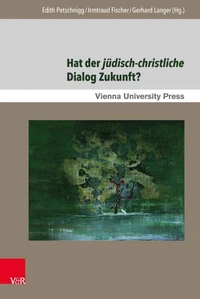Biblische Freundschaft. Jüdisch - christliche Basisinitiativen in Deutschland und Österreich nach 1945
Par :Formats :
Disponible dans votre compte client Decitre ou Furet du Nord dès validation de votre commande. Le format PDF est :
- Compatible avec une lecture sur My Vivlio (smartphone, tablette, ordinateur)
- Compatible avec une lecture sur liseuses Vivlio
- Pour les liseuses autres que Vivlio, vous devez utiliser le logiciel Adobe Digital Edition. Non compatible avec la lecture sur les liseuses Kindle, Remarkable et Sony
 , qui est-ce ?
, qui est-ce ?Notre partenaire de plateforme de lecture numérique où vous retrouverez l'ensemble de vos ebooks gratuitement
Pour en savoir plus sur nos ebooks, consultez notre aide en ligne ici
- Nombre de pages592
- FormatPDF
- ISBN978-3-374-05388-9
- EAN9783374053889
- Date de parution01/03/2018
- Protection num.Digital Watermarking
- Taille7 Mo
- Infos supplémentairespdf
- ÉditeurEvangelische Verlagsanstalt
Résumé
Von einer Lehre der Verachtung zu einer Lehre des Respekts: Nach 1945 erkannten Kirchen und Theologie langsam ihre antijüdische Geschichte und ihre Mitschuld an der Schoah. Ein wesentliches Resultat dieses Umdenkprozesses stellt der jüdisch-christliche Dialog dar. In Deutschland und Österreich etablierten sich in den Nachkriegsjahrzehnten jüdisch-christliche Basisinitiativen auf Grundlage der Hebräischen Bibel als gemeinsamer Glaubensurkunde von Judentum und Christentum.
Vier Pionierinitiativen stehen im Zentrum der Monographie, die Genese, Entwicklung und Bibelrezeptionen dieser Bildungsformate analysiert. Die qualitativ orientierte Studie gewährt den Wahrnehmungen und Erinnerungen von Dialogakteurinnen und -akteuren breiten Raum. [Bible-Based Friendship. Jewish-Christian Grass Root Initiatives in Germany and Austria after 1945] From a doctrine of contempt to a doctrine of respect: After 1945 Christian churches had to confront their own anti-Jewish tradition and recognized their complicity for the shoah.
The Jewish-Christian Dialogue is one significant result of that shift in mindset. In Germany and Austria, Jewish-Christian discussion initiatives based on the Hebrew Bible - a common document of faith shared by both Judaism and Christianity - were established in the first decades of the post-war period. This monography concentrates on four such dialogue initiatives, and the genesis and development of these dialogue-based educational formats and their reception of the Bible are analysed.
The qualitative study grants dialogue-participants ample space for their perceptions und experiences.
Vier Pionierinitiativen stehen im Zentrum der Monographie, die Genese, Entwicklung und Bibelrezeptionen dieser Bildungsformate analysiert. Die qualitativ orientierte Studie gewährt den Wahrnehmungen und Erinnerungen von Dialogakteurinnen und -akteuren breiten Raum. [Bible-Based Friendship. Jewish-Christian Grass Root Initiatives in Germany and Austria after 1945] From a doctrine of contempt to a doctrine of respect: After 1945 Christian churches had to confront their own anti-Jewish tradition and recognized their complicity for the shoah.
The Jewish-Christian Dialogue is one significant result of that shift in mindset. In Germany and Austria, Jewish-Christian discussion initiatives based on the Hebrew Bible - a common document of faith shared by both Judaism and Christianity - were established in the first decades of the post-war period. This monography concentrates on four such dialogue initiatives, and the genesis and development of these dialogue-based educational formats and their reception of the Bible are analysed.
The qualitative study grants dialogue-participants ample space for their perceptions und experiences.
Von einer Lehre der Verachtung zu einer Lehre des Respekts: Nach 1945 erkannten Kirchen und Theologie langsam ihre antijüdische Geschichte und ihre Mitschuld an der Schoah. Ein wesentliches Resultat dieses Umdenkprozesses stellt der jüdisch-christliche Dialog dar. In Deutschland und Österreich etablierten sich in den Nachkriegsjahrzehnten jüdisch-christliche Basisinitiativen auf Grundlage der Hebräischen Bibel als gemeinsamer Glaubensurkunde von Judentum und Christentum.
Vier Pionierinitiativen stehen im Zentrum der Monographie, die Genese, Entwicklung und Bibelrezeptionen dieser Bildungsformate analysiert. Die qualitativ orientierte Studie gewährt den Wahrnehmungen und Erinnerungen von Dialogakteurinnen und -akteuren breiten Raum. [Bible-Based Friendship. Jewish-Christian Grass Root Initiatives in Germany and Austria after 1945] From a doctrine of contempt to a doctrine of respect: After 1945 Christian churches had to confront their own anti-Jewish tradition and recognized their complicity for the shoah.
The Jewish-Christian Dialogue is one significant result of that shift in mindset. In Germany and Austria, Jewish-Christian discussion initiatives based on the Hebrew Bible - a common document of faith shared by both Judaism and Christianity - were established in the first decades of the post-war period. This monography concentrates on four such dialogue initiatives, and the genesis and development of these dialogue-based educational formats and their reception of the Bible are analysed.
The qualitative study grants dialogue-participants ample space for their perceptions und experiences.
Vier Pionierinitiativen stehen im Zentrum der Monographie, die Genese, Entwicklung und Bibelrezeptionen dieser Bildungsformate analysiert. Die qualitativ orientierte Studie gewährt den Wahrnehmungen und Erinnerungen von Dialogakteurinnen und -akteuren breiten Raum. [Bible-Based Friendship. Jewish-Christian Grass Root Initiatives in Germany and Austria after 1945] From a doctrine of contempt to a doctrine of respect: After 1945 Christian churches had to confront their own anti-Jewish tradition and recognized their complicity for the shoah.
The Jewish-Christian Dialogue is one significant result of that shift in mindset. In Germany and Austria, Jewish-Christian discussion initiatives based on the Hebrew Bible - a common document of faith shared by both Judaism and Christianity - were established in the first decades of the post-war period. This monography concentrates on four such dialogue initiatives, and the genesis and development of these dialogue-based educational formats and their reception of the Bible are analysed.
The qualitative study grants dialogue-participants ample space for their perceptions und experiences.


